- Home
- Sara Shepard
All the Things We Didn't Say Page 4
All the Things We Didn't Say Read online
Page 4
Sometimes, when my father spent whole weekends in bed, I crawled in with him, and we watched cartoons. My father laughed at them as much as I did. When I got out of bed, he stayed, but I still thought I’d accomplished something. ‘Mom thinks you’re being lazy,’ I said to him once, not that long ago. ‘I’m not lazy,’ he answered, ‘I’m just sad.’
He got sad a lot. Once, my father started crying in a line at the movie theater, putting his face in his hands and shaking. My mother made him go around the corner to an alley because everyone was staring at us, wondering what was wrong. I thought I should go after him, but my mother grabbed my arm. ‘Don’t,’ she said. ‘He’ll be fine.’
‘What’s he crying about?’ I asked.
My mother just shrugged and rolled her eyes. ‘It’s so embarrassing,’ she hissed. ‘I don’t know why he can’t just pull himself together. But it’s like he can’t help it.’
I wanted her to explain. What was so embarrassing? Crying? Feeling? Should I be angry at him, too? The movie posters blurred in front of my eyes. When it was our turn to buy tickets, we bought three, one for me, one for my mother, and one for my father. We waited for him to return from the alley, and then we went in the theater together.
Last Friday, when I came home from school, I found my father sitting at the kitchen table, looking at an envelope. His name was written on the front in my mother’s handwriting. She’d made the R in Richard very big, but the letters got smaller and smaller, descending into almost nothing. The d at the end wasn’t much bigger than a pencil point.
‘What’s that?’ I asked.
‘Nothing.’ He covered it up with his hand.
We went to the ice cream parlor on the Promenade despite it being early December and cold. My father, well over six feet tall, towered over everyone else in the little shop. He was wearing the black wool overcoat my mother had bought for him. His face was clean-shaven, his thick, light brown hair combed off his forehead. He bought me an espresso milkshake, which I loved, even though they made me twitch. We sat in a little booth in the back, and he ate a whole scoop of butter pecan before he told me that Mom had gone on a work trip. She’d probably be back in a week or so; in the meantime, could I help him keep the house clean?
I said sure, no problem. I’d been helping keep the house clean for the past few months anyway, ever since my mother’s job had become more demanding. But I could tell there was something more. It was so easy to tell when my father was lying-his cheeks got very pink, and it looked like he was literally holding something in, like a sneeze. ‘Okay, okay, Mom isn’t on a trip,’ he blurted out, as if I’d harshly interrogated him. ‘She’s gone.’
His facial features seemed scrambled, like those tile puzzles where you have to move the pieces around to make a coherent picture. ‘What do you mean, gone?’ I asked.
He blotted his eyes with his sticky ice cream cone napkin. ‘She wrote a letter. But it wasn’t very clear.’
I felt an uneasy stab and let out a whimper. ‘No, Summer, please don’t cry,’ he said desperately. ‘I don’t know what to do.’
He bent over until his head touched the top of the table. His shoulders shook up and down. A few minutes went by, and he didn’t stop. ‘Dad?’ I touched his shoulder. ‘Come on.’
‘I just don’t know why this happened,’ he blubbered.
By this time, a horrible feeling was sloshing through me. I thought of the things I’d done wrong, all my shortcomings. This could be because of me. Because of something I wasn’t.
But I couldn’t have my father sitting in the ice cream shop, bawling. ‘Dad.’ I took him underneath the arm and pulled him up. ‘She’s probably just…overworked. I saw it on Oprah. People in this country get only ten days of vacation, but people in Europe get thirty. She probably went somewhere where there aren’t any ringing phones.’ It poured from inside me. When I finished, I reviewed what I’d just said, not sure if it made any sense.
He raised his chin. Some old ladies in the next booth over were staring. ‘Do you think?’ my father asked, his face red and wet.
‘Yes.’ I said it so confidently, I almost convinced myself.
My father ran his hand over his hair. ‘Jesus, Summer.’ He bumped into me, hugging my head to his. ‘I’m sorry I just did that. That’s the last thing you want to see, huh? Your crazy old dad, losing it in the ice cream parlor?’
‘It’s fine,’ I said.
He looked at me, nodding. ‘You’re right. She’s on a trip.’
‘She’s on a trip,’ I whispered back.
It wasn’t much to hold onto, but I held onto it anyway.
3
Another weekend passed. Another Monday, another Tuesday. Her mail, a week and a half’s worth by now, teetered unopened on the hall table. None of us dared to move it. Moving it might mean one of us had come to a conclusion, a decision. So the pile continued to grow unabated, her name on every credit card offer, every magazine, every catalogue for shoes or clothes or home decor.
Tuesday night, I woke up to the moon gawking at me through the window. It was so large and round and perfectly centered in my windowpane, for a moment it felt like the moon was all mine.
When I went downstairs to get a glass of juice, the boxes of Christmas cards my mother had bought right after Halloween were on the table, as was my mother’s Kelly-green address book. The cards were on heavy card stock, and the envelopes were foil lined.
Earlier today, Claire had come over for biology tutoring. A week had passed since Claire had returned from France, but I hadn’t seen her at school except for that first day. I wanted to ask her about it, but it didn’t seem like something I should bring up in front of my dad, who sat at the kitchen table with us, staring at this very same box of Christmas cards.
‘How does one write a Christmas card?’ he muttered. ‘And there are two hundred and fifty people on this list. I don’t even know two hundred and fifty people.’
Finally, he threw down his pen and stood up. ‘What about the cards?’ I called.
‘I have no idea what to say,’ he answered flatly. His bedroom door slammed.
I straightened my biology notes and looked at Claire, hoping my cheeks weren’t burning. ‘I’m sure my mother will do them when she gets back.’
Claire’s eyes bulged. A clear, obvious thought slid across her face.
‘What?’ I snapped. Claire looked down.
When I shifted my books, Claire cleared her throat. ‘I saw you getting coffee for all those girls last week.’
I bristled. ‘So?’
Claire traced over a star on her notebook, not following the lines. It devolved from a star to a scribble. ‘It shouldn’t be your job to get coffee for everyone. You shouldn’t be their errand girl.’
I clicked my pen on and off, gripped with anger. The girls I got coffee for were the same girls Claire used to be friends with-the girls, in fact, from the back of the bus. I volunteered to get coffee for them. It was not like they were holding me at gunpoint.
Claire looked up at me, her gaze unwavering. There was such a sage look in her eye, as if she could see straight through my skin. It made me think of a recurring dream I sometimes had, the one where I had no outer covering. Everyone was able to see right through me to my organs and inside my brain, aware of what I was thinking and feeling at all times. I was called a Visible, and I had to go to a special school with the rest of the Visibles. My mother, disappointed, showed me her high school yearbook and told me that she wasn’t a Visible when she was my age. It always catapulted me from sleep, causing me to run to the mirror and stare hard at my whole body, making sure my skin was still opaque.
The digital clock on the microwave clicked now from 2:59 to 3:00. I pulled a Christmas card out of the box and held it in my hands for a long time. The pen cap unscrewed easily. I could do them. I had good handwriting. There weren’t that many, really.
‘What are you doing up?’
My father’s eyes were squinty slits. He had tied the belt
of his robe in a messy knot around his waist.
‘I’m doing the Christmas cards.’ I made a flourished squiggle on a piece of scrap paper. My mother always used excellent pens for Christmas cards and other correspondence. Fluid ink, fine-tipped, with a gold handle.
My father sat down next to me at the table, watching as I addressed the first one. It was to a Dr and Mrs Myron Finkelstein. I had no idea who they were. I decided I would just sign my mother and my father’s names and not include any sort of holiday greeting. I wrote out their address, slid the card in the envelope, and licked it to seal.
‘You don’t have to do that,’ my father said quietly.
‘I’m sure Mom will appreciate it once she comes back.’
‘Summer,’ my father began. His voice sounded funny, as if there were hands wrapped around his neck. ‘Summer…Mrs Ryan and I were talking. About…this.’
I stopped writing out the address for Dr Melissa Hailey and looked at him sharply, almost punishingly. ‘Why did you tell her?’
‘Mrs Ryan and I are kind of in the same position.’
‘No, you’re not.’
He folded his hands on the table. I shut my eyes, hoping that he wouldn’t say anything else. Finally, I heard him sigh. ‘We’ll do shifts. You work for a half-hour, and then I’ll work on them for another half-hour. We’ll get done faster that way.’
I watched as he walked to the living room and stretched out on the couch. The light of the Christmas tree cast pale yellow light over his cheeks, making him look like a kid. Across the harbor, the buildings’ lights twinkled sweetly.
I scratched out all the envelopes, trying to keep my handwriting as neat as possible, listening to the kitchen clock ticking. I signed my parents’ names on every card. Their names looked so nice together, Richard and Meredith Davis. It was so melodic. My father said that when they started dating, there was no one else in the world except for the two of them. She was so beautiful, he said, the kind of beautiful that knocked you down. They walked hand in hand down a street, whispering things to each other, pausing under streetlights to kiss. They fed each other bites of food and talked in the rain for hours. My father made up songs for her. My mother bought him cashmere sweaters. They were the only people each of them had ever loved.
Love like that didn’t die. Love like that didn’t write a letter and leave.
I tried to envision the love of my life, but there was no one at school who even came close. So he’d have to be new, from somewhere else. He’d come up to me while I was at my locker, put his arms around me and say, ‘Summer Davis, forget about all of them. Forget about everything. I’m here for you. I’m all you’ll ever need. Never let me get away.’
And I wouldn’t. I’d know something good when it was there. Just as my mother should. We were right in front of her, after all. We were here.
The next morning, I teetered through the double doors that led from the courtyard to the school hallways, balancing four cups of hot coffee wedged into a corrugated cardboard holder. A bunch of guys shoved their way in front of me, and I didn’t catch the door before it closed. It knocked against my legs, tipping me sideways. I watched helplessly as the coffees dislodged from the carrier and fell to the ground, their plastic lids popping off, the coffee slowly glugging into the cracks in the sidewalk. Steam waltzed through the chilly air.
Students stepped daintily around the spilled coffee, barely noticing. I peered into the hall; the girls in my French class were leaning against the water fountains, waiting for me where they always did. By the looks on their faces, I was pretty sure they’d seen the coffee spill, too.
They were tall and straight-haired and pink-cheeked, with perfectly manicured fingernails and bra straps that didn’t fall down off their shoulders to mid-arm. Ever since Claire joined them at the back of the bus, I’d watched them with envy. Summer should have more girlfriends, my mother had whispered to my father in the kitchen. Does it really matter? my father had replied. But yes, yes it mattered. It mattered more than he would ever understand. That we were talking, that I was getting them coffee; it all seemed like such a step in the right direction.
The coffee trickled into the sewer grate. The girls’ eyes narrowed, their mouths went slack. I turned back to the coffee cart, thinking. I had lunch money in my wallet, but it wasn’t like I was eating much lunch these days. I could use it to get the girls new coffees, gratis, to make up for my mistake.
But when I looked over my shoulder to see if they’d like this plan, I saw the girls had turned for the stairs, laughing and wrapping their arms around their shoulders. Slowly, more and more students separated me from them, and after just a few moments, I couldn’t see them at all. Something occurred to me, then: What if my mother chose this moment to walk into school, this moment to see me? I was alone. As usual. There was as much chance of her seeing this as there was of her seeing something good. It wasn’t as if I had any control.
The bell started to ring, but I didn’t move. I wasn’t sure I could move. As the courtyard cleared out, a janitor emerged from a utility closet, carrying an empty red bucket. He met my eye. ‘Don’t you need to get to class?’ he asked, motioning for the door.
He was an older man, with long gray tufts sprouting out of his oversized ears. There was a name stitched over the right breast of his blue jumpsuit. Stan. I liked his functional black shoes, the gold class ring he wore on his right hand.
‘If a woman takes off from her family without really saying where she’s going, she’s coming back, right?’ I blurted out before I could stop myself.
Stan blinked his watery blue eyes, just a few feet away. ‘Sorry?’
‘I mean, she left all her clothes here. And her shoes and her bags and her cat.’ I swallowed. ‘She left a lot of…other things, too.’
He didn’t say anything, just gave me a sad smile and turned for the double doors. By then, the courtyard was completely empty. I’d never lingered in the courtyard after the bell had rung; I always thought a police officer would appear, pushing everyone where they belonged. I looked around, then took a few careful steps toward the wrought-iron gate. It wasn’t locked. When I pushed on it, the gate creaked open easily. No one noticed.
So I left.
And still nothing happened. The gate made no noise when I shut it again. The cars on Lincoln Street swished by, oblivious. To my left, eventually, was the park. I started walking.
I walked up Lincoln and took a right on Eighth Avenue, looking right and left. It didn’t take long before I realized who I was looking for. But she wasn’t there. She wasn’t anywhere I thought she’d be.
Snow began to swirl down. My backpack jostled against my lower back, and my toes prickled with the cold, shielded only by a thin strip of flimsy loafer leather. People streamed past, none of them her. I walked under the Grand Army Plaza arch and crossed the street to the park.
‘Summer?’
I stopped, my heart speeding up. But it was Claire Ryan across the road, standing at the park’s entrance. She was smoking a cigarette. Her red jacket and jeans were enormous.
I crossed the street slowly, in a daze. ‘What are you doing here?’ Claire demanded.
‘What are you doing here?’ I shot back.
She shrugged, turning her palms to the sky. ‘I don’t know. It’s snowing.’
An old man in a shiny red jogging suit stamped through the thin layer of snow. A runner stooped to tie his shoe. He was wearing shorts. It was 30°F out. ‘You don’t go to school,’ I pointed out to Claire, as if solving a mystery, even though, in hindsight, it was painfully obvious.
‘Yeah.’ Claire looked down. ‘So?’
‘So, wait. You get off the train and, instead of coming to school, you come up here?’
‘Uh huh.’ She sucked so hard on the cigarette, it crackled.
I blinked furiously. ‘And the office hasn’t called your parents?’
The smoke mixed with the falling snowflakes. ‘That’s something I missed about you,’ she said. ‘You
’re always worrying about that stuff.’
‘But…I mean…’
‘They might have called. My mother hasn’t said anything. Or maybe they haven’t. Perhaps I’m invisible. Although, I’m not sure how I could be invisible.’ She let out a bitter laugh, spreading out her arms, showing off her size. I recoiled, shocked by her candidness.
We were quiet for a moment, breathing out cottony puffs. Then Claire said, ‘Do you remember when we had that Mega Man tournament at the beach? You did that victory dance?’
‘I don’t know. Sort of.’
Claire pushed her sneaker into the dried grass. ‘I guess life isn’t so simple anymore.’
I stiffened. ‘What you mean?’
Claire looked at me out of the corner of her eye. My mind started to churn. It was odd that Claire wasn’t pushing to know why I’d left school. She knew I was too anal and ruleabiding to ditch, that something must have been really wrong. And yet she hadn’t asked.
The realization trickled in. I looked at her sharply, enraged. ‘Whatever you think you know isn’t true.’
Claire stepped back, startled.
‘And anyway, you shouldn’t talk.’ The words spilled out before I could harness them. ‘I know about that French guy and your mom.’
Claire’s mouth made a small o.
‘I know about her affair,’ I went on. ‘She ruined a perfectly good marriage.’
Claire slowly shook her head, then ran her hands through her hair. It took her a while to respond. ‘My mom didn’t have an affair with anyone,’ she said, speaking into her chest. ‘It was my father. He had an affair with a girl. Like, a teenager. She was barely older than me. But my mother’s too proud to take his money, which is why we’re basically living in a crack house.’
A garbage truck circling Grand Army Plaza blew its horn. Another runner passed, making crisp footprints in the dusting of snow. I thought about how Mrs Ryan had looked so crumpled and defeated at our house the other day. But I didn’t want Mrs Ryan to be the victim. She couldn’t be. Mrs Ryan and I are kind of in the same position, my father had told me last night, when I was starting on the Christmas cards.

 Heartless
Heartless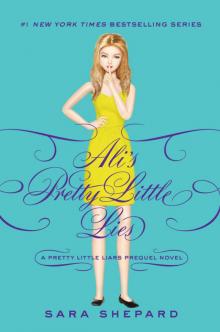 Alis Pretty Little Lies
Alis Pretty Little Lies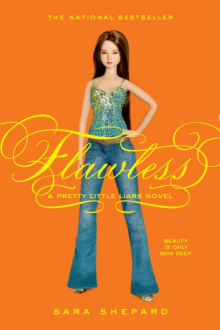 Flawless
Flawless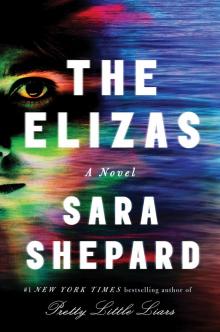 The Elizas
The Elizas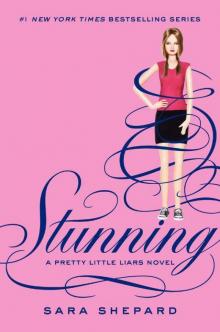 Stunning
Stunning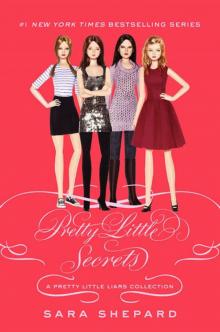 Pretty Little Secrets
Pretty Little Secrets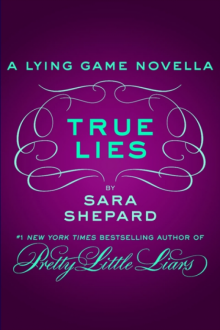 True Lies
True Lies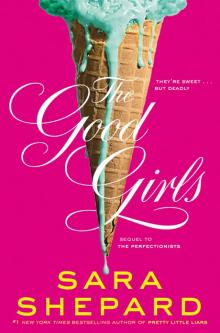 The Good Girls
The Good Girls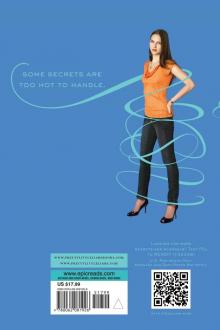 Burned
Burned Perfect
Perfect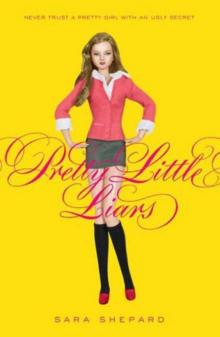 Pretty Little Liars
Pretty Little Liars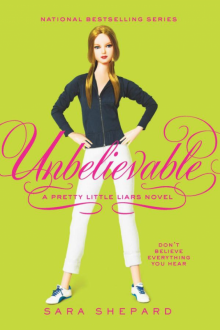 Unbelievable
Unbelievable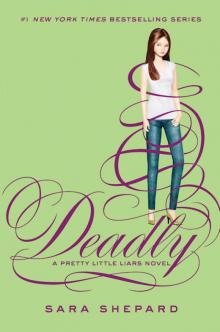 Deadly
Deadly Vicious
Vicious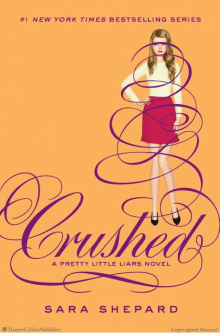 Crushed
Crushed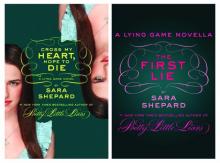 The First Lie
The First Lie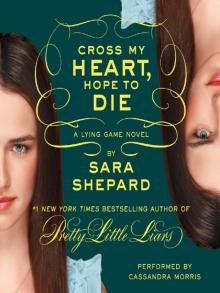 Cross My Heart, Hope To Die
Cross My Heart, Hope To Die The Lying Game
The Lying Game Wicked
Wicked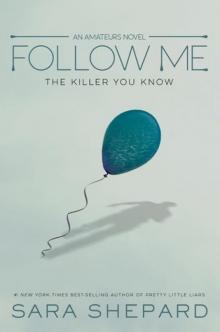 Follow Me
Follow Me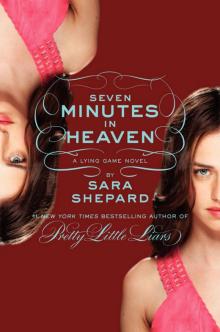 Seven Minutes in Heaven
Seven Minutes in Heaven The Perfectionists
The Perfectionists Killer
Killer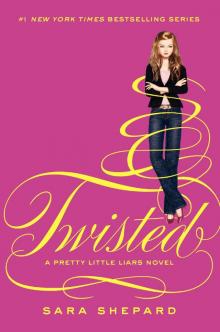 Twisted
Twisted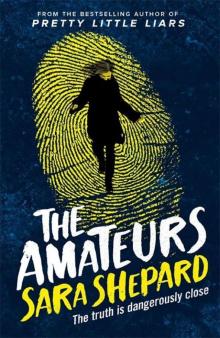 The Amateurs
The Amateurs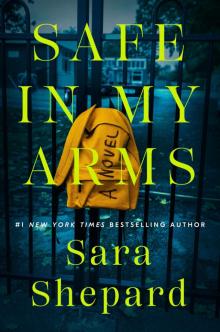 Safe in My Arms
Safe in My Arms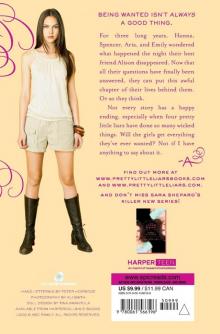 Wanted
Wanted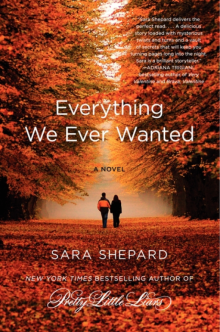 Everything We Ever Wanted
Everything We Ever Wanted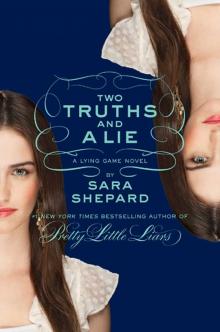 Two Truths and a Lie
Two Truths and a Lie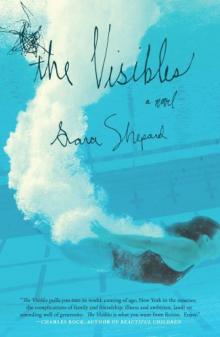 The Visibles
The Visibles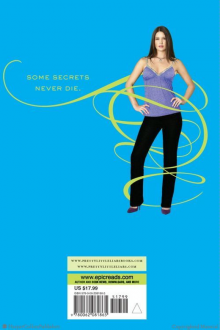 Ruthless
Ruthless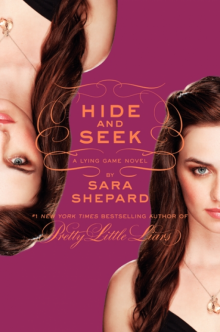 Hide and Seek
Hide and Seek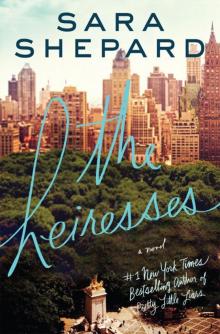 The Heiresses
The Heiresses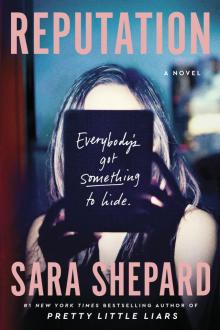 Reputation
Reputation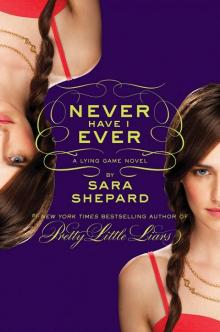 Never Have I Ever
Never Have I Ever Toxic
Toxic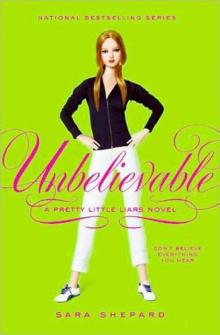 Unbelievable pll-4
Unbelievable pll-4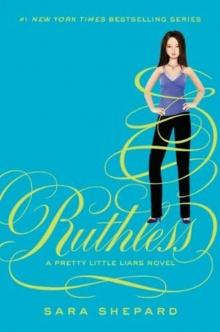 Ruthless pll-10
Ruthless pll-10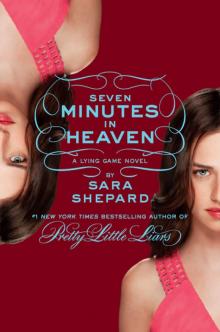 Seven Minutes in Heaven tlg-6
Seven Minutes in Heaven tlg-6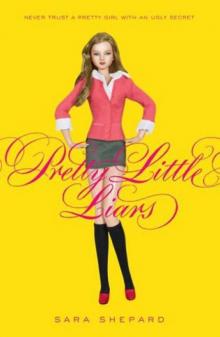 Pretty Little Liars pll-1
Pretty Little Liars pll-1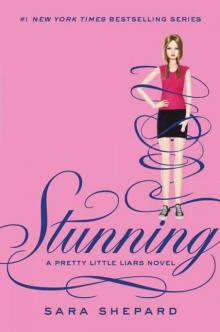 Pretty Little Liars #11: Stunning
Pretty Little Liars #11: Stunning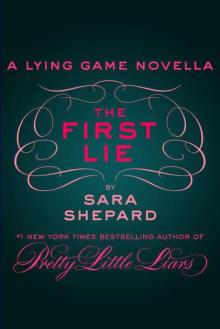 4.5 The First Lie (the lying game)
4.5 The First Lie (the lying game) The Amateurs, Book 3
The Amateurs, Book 3 Wanted pll-8
Wanted pll-8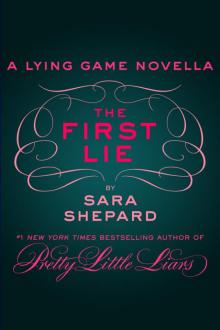 Lying Game 00: The First Lie
Lying Game 00: The First Lie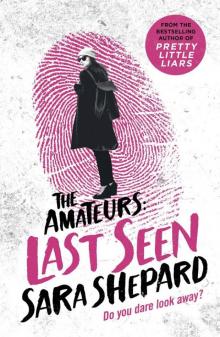 The Amateurs: Last Seen
The Amateurs: Last Seen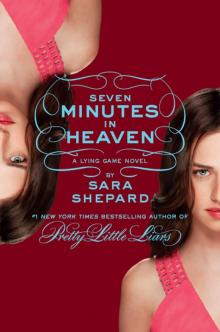 The Lying Game #6: Seven Minutes in Heaven
The Lying Game #6: Seven Minutes in Heaven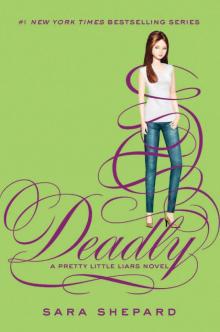 Pretty Little Liars #14
Pretty Little Liars #14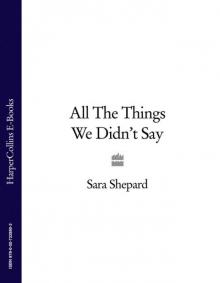 All the Things We Didn't Say
All the Things We Didn't Say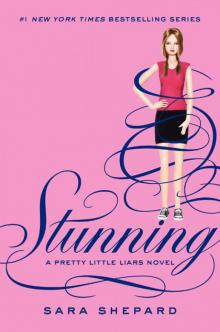 Stunning pll-11
Stunning pll-11 Heartless pll-7
Heartless pll-7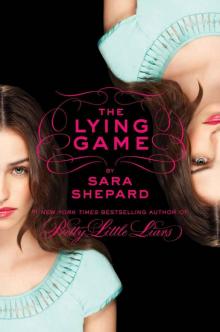 The Lying Game tlg-1
The Lying Game tlg-1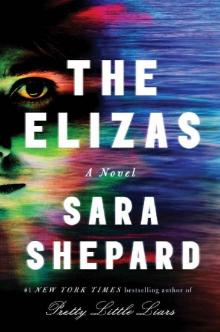 The Elizas_A Novel
The Elizas_A Novel Perfect pll-3
Perfect pll-3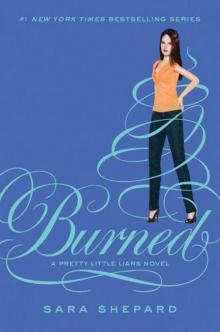 Burned pll-12
Burned pll-12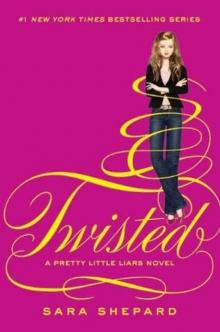 Twisted pll-9
Twisted pll-9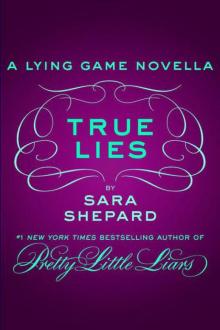 True Lies: A Lying Game Novella
True Lies: A Lying Game Novella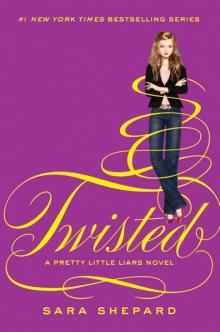 Pretty Little Liars #9: Twisted
Pretty Little Liars #9: Twisted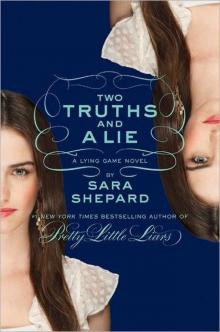 Two Truths and a Lie tlg-3
Two Truths and a Lie tlg-3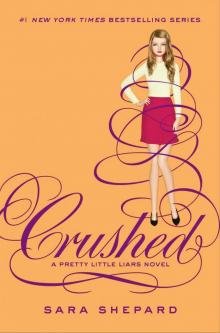 Crushed pll-13
Crushed pll-13 Pretty Little Liars #15: Toxic
Pretty Little Liars #15: Toxic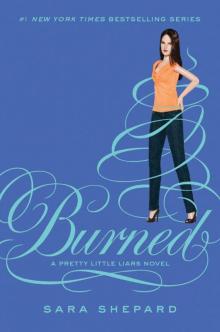 Pretty Little Liars #12: Burned
Pretty Little Liars #12: Burned Killer pll-6
Killer pll-6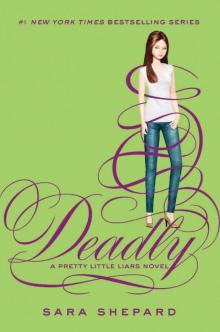 Pretty Little Liars 14: Deadly
Pretty Little Liars 14: Deadly